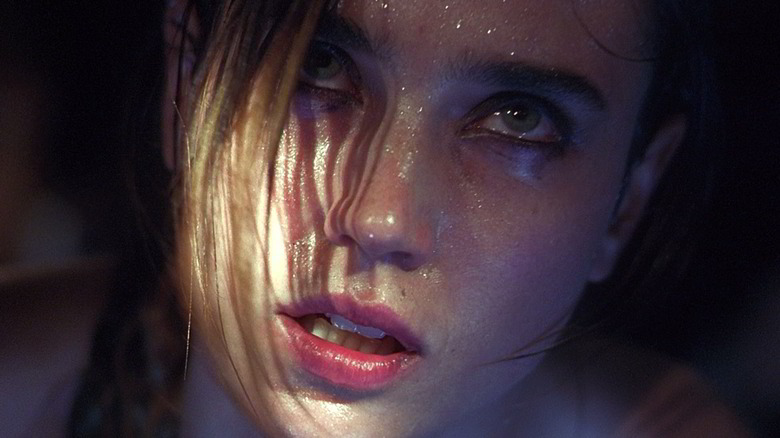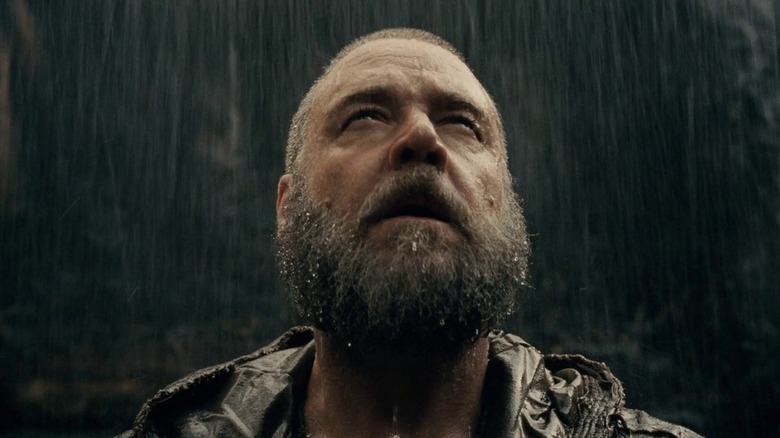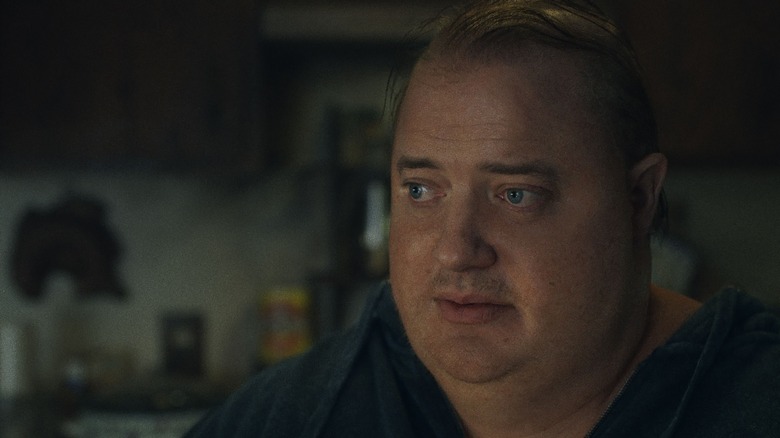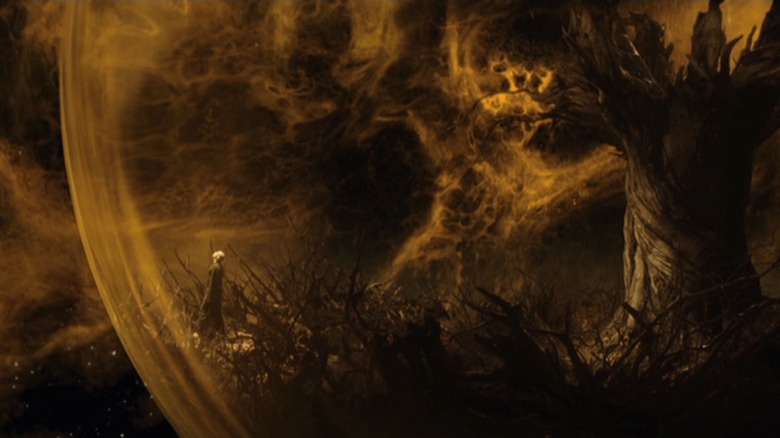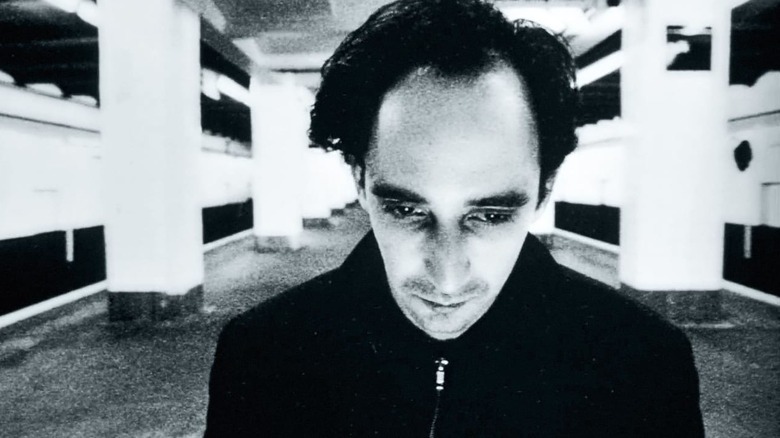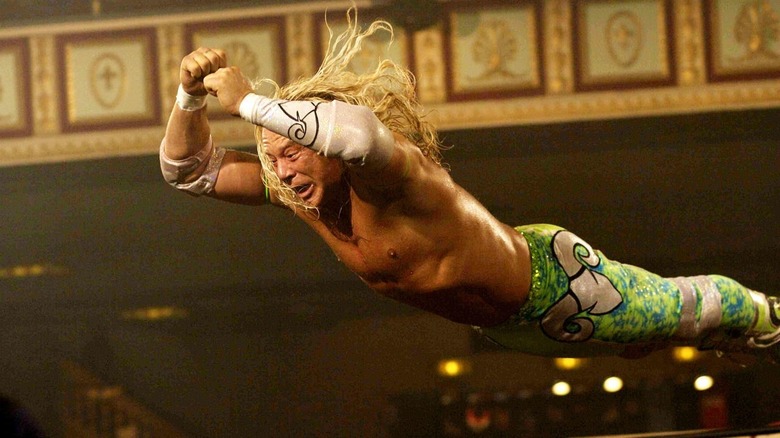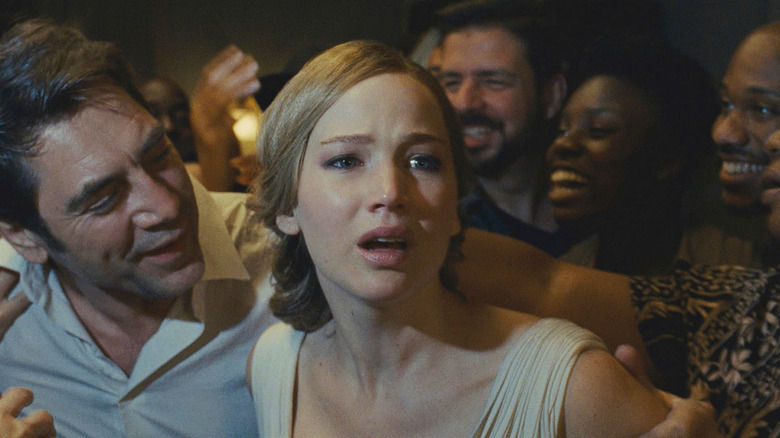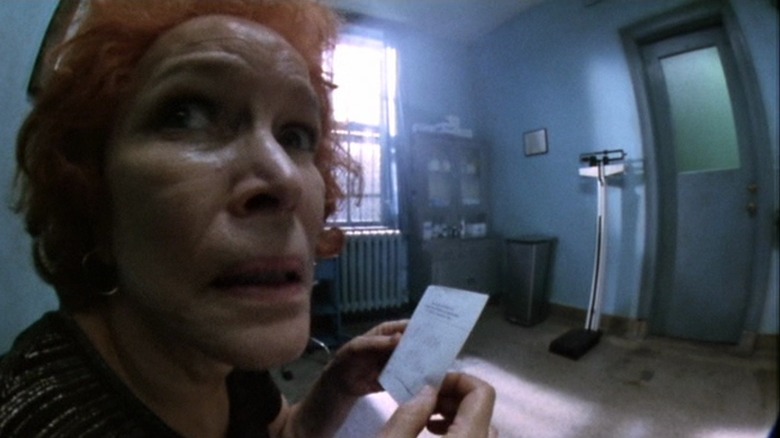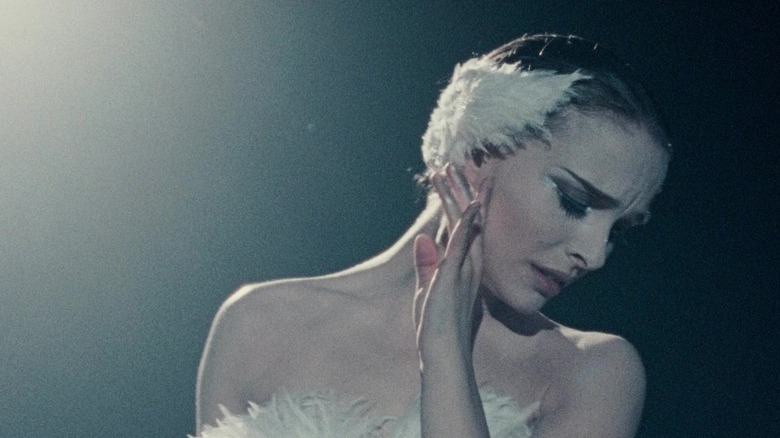Every Darren Aronofsky Movie Ranked From Worst To Best
You do not simply watch a Darren Aronofsky movie. You feel a Darren Aronofsky movie. The Brooklyn-born filmmaker crafts his distinctive films in order to elicit a visceral response across multiple senses, leading to movies that stick with you long after the credits roll. And while Aronofsky's work spans many genres — epic, sci-fi, drama, thriller, and horror — a common thread of obsession and prophetic premonition unites them all.
And yet, Aronofsky's sensorial cinema never feels like shock value for its own sake. His jolting artistic choices always work in tandem with the narratives they help convey. It's not hard to see what draws Aronofsky to such driven characters, either. The compulsiveness of their quests to reach unattainable extremes reflect Aronofsky's own attempts to impose order onto the chaos of the world using the grammar of cinema.
Even Darren Aronofsky's least successful efforts are fascinating. He has made good movies and bad movies, but he has never made an uninteresting one. While Aronofsky sometimes stumbles in the execution, he has an undeniably lofty goal with each project; what separates his worst films from his best is how fluently he can bring the visions inside his head to the screen.
8. Noah
Through the Biblical story of Noah's ark, Darren Aronofsky created a Trojan horse with which he could foist an ecological parable onto mass audiences. The ardent environmentalist gets a little too preachy with "Noah," however, and his hundred million-dollar plus epic is the film where Aronofsky's reach most glaringly exceeded his grasp.
It's impressive that Aronofsky got a studio to back a vision that flies in the face of every stodgy genre convention, and that shows little interest in hitting the big points from Sunday school. But "Noah" always seems a bit adrift (or, perhaps better stated, the studio let Darren Aronofsky go out to sea). "Noah" tries to have it both ways, channeling the elemental simplicity of the familiar story while adding tortured ambiguity, superfluous subplots, and CGI creatures. Aronofsky gets no life raft from the lethargic performance of his lead leading man, Russell Crowe, either.
Aronofsky does manage to work in some unexpected montages, such as the arrestingly edited fall of man, that pack the same punch as his smaller-scale work. Yet that creative spark doesn't scale, and it's hard to miss within a film that quite literally constructs a giant ark. Dismissing "Noah" as pure folly ignores some of the small miracles Aronofsky pulls off, but he's pretty clearly outmatched by the scope of the project.
7. The Whale
Don't let sympathy and admiration for Brendan Fraser and his vulnerable turn in "The Whale" blind you to what Darren Aronofsky's filmmaking is doing. The title's irony really hammers home the cruelty as it gawks mercilessly at Fraser's 600-pound Charlie and his difficulty to perform tasks like moving and breathing. Aronofsky assumes the character's tragedy will elicit the audience's empathy — and relies on Fraser's on-screen persona to generate the goodwill necessary to bridge the gap. Each viewer's willingness to tolerate uninspired filmmaking likely varies based on their love of the star.
For as kinetic a filmmaker as Aronofsky can be, "The Whale" is startlingly self-contained and inert. The single-location drama struggles to break free of its origins on the stage, with little flourish added to enliven a series of morose conversations. The film functions as a kind of countdown clock, as Charlie fends off his body's collapse to try and make things right with his estranged daughter, Ellie (a strident Sadie Sink). They're doing little more than trading platitudes as Aronofsky surveys bodily and emotional extremes with longtime cinematographer Matthew Libatique. This is well-worn territory for the filmmaker, and there's little evidence that he brings a new gaze or approach to a narrative he's explored before — and better.
6. The Fountain
"The Fountain" runs a slender 96 minutes. For a story that sees Hugh Jackman playing three different personalities across centuries of time, it's not enough. It feels like the film needs to be twice as long to do its various plot threads justice.
In fairness to Darren Aronofsky, the brevity may not be entirely his doing. In interviews, the filmmaker alludes to clashes with the studio, to the point that he lost the will to fight for his vision. Aronofsky's exploration of love and loss across eras and dimensions collapses an epic narrative into intimate terms by depicting various iterations of Jackman and Rachel Weisz as star-crossed lovers. Yet, the studio backing that should enable him to paint on a grand canvas feels more like a straightjacket, limiting Aronofsky's ability to express the connections between the stories using small visual tricks. This subtlety feels at odds with a bombastic story, in which Hugh Jackman's characters seek to triumph over death itself.
Perhaps a director's cut would land higher in a ranking of his work (he's been saying since 2008 that there's enough unused footage from "The Fountain" to make something unexpected and enriching). Unfortunately, we have to work with the film as it is now, and "The Fountain" currently stands as a fascinatingly but flawed compendium of parallels that never quite cohere into a satisfying whole.
5. Pi
Oh, to have been in the room for the Sundance premiere of Darren Aronofsky's "Pi" in 1998. The film that immediately launched Aronofsky into the stratosphere must have landed with the force of a lightning bolt on the unsuspecting crowd. Like many debut movies, "Pi" is a sprawling mess of unbridled visual and thematic curiosity. In 84 minutes, it feels as if Aronofsky spews out the contents of every thought that ever addled his brain over the two decades of his life. Only a director this green, this unsullied by the industry, could churn out a film that attempts to make possible the impossible.
In "Pi," a frenetic number theorist, Max Cohen (Sean Gullette), grapples with various frameworks within which people seek to understand the workings of the world, examining everything from logic to faith, mathematics to organized religion. "Pi" definitely has that first film feeling about it, which is fine — never hold a director's earliest work against them! — and it's all over the place, not necessarily intentionally. But the sign of a great filmmaker, especially at the beginning of their career, is that the passion shines through the imprecision. As far as early calling cards go, Darren Aronofsky could scarcely have crafted a better encapsulation of the themes and stylistic flourishes that would propel his filmmaking for decades to come.
4. The Wrestler
According to Aronofsky, he began developing "The Wrestler" and "Black Swan" in tandem before splitting them into separate projects. With that in mind, it's easy to spot the similarities between Mickey Rourke's Randy "The Ram" Robinson and Natalie Portman's Nina Sayers: Both push their bodies to dangerous lengths in order to reach the pinnacle of success in their chosen fields. While athletes and artists are often opposites in the popular imagination, Aronofsky finds a number of similarities between the two, thanks to pinpointing their shared asceticism and sense of dogged determination.
Even if Robert Siegel's script steers "The Wrestler" towards melodramatic sports movie clichés, the film makes for a worthy entry in Aronofsky's filmography. This character study of a bruised fighter willing to trade away his health, family, and financial stability to make one last improbable run at glory offers a fascinating glimpse into the dark heart of the American male ego. The cinema verité-style cinematography of Maryse Alberti translates this archetypal narrative into raw, emotional images that sear and soar in equal measure.
The film does not just rest on the laurels of its brilliant meta-casting of Rourke, himself a washed-up superstar who let fame and excess get the better of him, either. Aronofsky pushes the actor to the far reaches of his emotional range as frequently as he punishes Rourke physically, leading to both an Oscar nomination for best actor and reviving Rourke's flagging career.
3. mother!
There are no fewer than three stories occurring within Darren Aronofsky's "mother!," all of which battle for dominance throughout the movie. On the surface, there's a flailing poet known as Him (Javier Bardem) trying to write his masterpiece in seclusion while staving off any attention or support from his doting — and pregnant — wife, Mother (Jennifer Lawrence). Then, there's a restaging of the Bible from Genesis to Revelations in allegorical form. Finally, Him and Mother's house also represents the Earth itself, acting as a metaphor for the damage that human greed and selfishness does while ripping it apart.
Aronofsky packs every second of "mother!" with ideas and information. The movie is an unceasing assault on the senses, intent on reproducing the stress Lawrence's character feels within the viewer, and only picks up velocity as it plows forward. Like the situation unfolding before our eyes, Aronofsky's film feels combustible; the next move could be the one that brings the whole structure crumbling down. The rickety contraption holds, though it definitely buckles under the weight of Aronofsky's script.
Still, flawed as it may be, it's hard not to stand in awe of a film that goes for broke as assuredly as "mother!" does. Love or loathe the final result, there's no way to feel lukewarm about a movie that takes direct aim at its audience's emotional jugular.
2. Requiem for a Dream
Some films make such an impact that you want to watch them again and again. Others make such an impact that you know one watch will prove sufficient. "Requiem for a Dream" is the latter. At the impressionable age of 15, I watched this haunting tale of four people spiraling into the throes of various addictions on a grainy DVR recording while my parents ran errands and let out an audible, extended scream at the film's climax. I both recognize the film's brilliance and also never feel the need to put myself through that emotional gauntlet again.
But "Requiem for a Dream" represents more than just a feature-length "Scared Straight" talk about hard drugs. Aronofsky finds wrenching tragedy in a quartet of connected New Yorkers on a downward trajectory. Each character naively turns to narcotics as a means to unlock future prosperity, blithely unaware that the drugs will be their undoing.
While the journey of three young junkies trading in heroin is harrowing, their storyline is nothing compared to the breakdown of the elderly widow Sara Goldfarb (Ellen Burstyn). Her doctor gets her hooked on diet pills — speed, essentially — so that she can be in peak physical condition when she appears on her favorite game show. Unlike the other characters, Sara is not aware of her addiction until she's lost in its power. Even worse, Aronofsky doesn't let us look away, locking us into the characters' unravelings with his relentlessly fast-paced editing, immersive cinematography, and overwhelming soundscape.
1. Black Swan
"Black Swan" effortlessly combines numerous genres — psychological horror, backstage drama, female melodrama, and claustrophobic thriller — into the kind of sublime achievement Natalie Portman's ballerina Nina doggedly pursues in her own art. She's an avatar for Darren Aronofsky, and yet totally unique among his protagonists. Rather than tame the forces of order and chaos, "Black Swan" makes Nina embody their duality.
As a tenacious dancer and technical master, Nina can flawlessly channel the controlled grace of the White Swan in her company's production of "Swan Lake." But that focus on form keeps Nina from finding the edge and excitement necessary to play the character's other half, the devilish Black Swan. Nina's attempt to explore the dark, dangerous side of her craft leads her down a path that pushes her to mental and physical extremes. She must overcome jealousy, manipulation, and doubt, and face down the enemy standing in the way of her greatness: herself.
"Perfect," Nina says at the finale of the film. "I was perfect." If Nina is the quintessential Darren Aronofsky character, what an enormous flex it is for him to call his shot through her parting words. It's a recognition of tremendous accomplishment and the culmination of his career, one that stops short of outright jubilation because it comes at a tremendous cost. As a marriage of sensational storytelling, personal passion, and virtuosic visuals, "Black Swan" is the ultimate Darren Aronofsky experience. Perfect, indeed.
